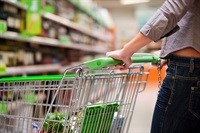According to local health and hygiene firm Bidvest Steiner, a 2011 study in the US found that supermarket shopping trolleys rival the average public toilet as a health risk. The study examined 85 trolleys and found that 72% of them tested positive for faecal bacteria and half carried traces of e.coli, the source of the most severe (and sometimes fatal) 'food poisoning'.

Image: © Kzenon - Fotolia.com
"Any surface that is routinely touched by multiple people poses a risk of infection," says Rika van Rooyen, of Bidvest Steiner. "Hands are one of the biggest factors in the spread of viruses, so it stands to reason that supermarket trolleys should act as transfer mechanisms for all sorts of unpleasant microbes."
She also referred to the Dettol Habit Study, one of the largest studies of hygiene behaviour conducted globally. It found that just under half of all people (46%) did not follow good personal hygiene habits by washing their hands with soap five or more times a day. South Africans, the study showed, pretty much conform to this average although they show a lower propensity to use anti-bacterial soap than the global average.
In short, the health safety of the trolley, and particularly its handle, is directly dependent on the hand hygiene of those unknowns who have used it since its last wash. She suggested that consumers request that their local retailers provide adequate trolley wipes, hand sanitizer stations and other services aimed at safeguarding the health of their patrons.
There is an additional concern that toddlers sitting in trolleys are at particular risk of coming into contact with dangerous bacteria. An added consideration is that toddlers are prime spreaders of infection.
"The problem is that while public toilets are generally cleaned frequently, using reliable chemicals, very few shops have a routine trolley sanitising programme. Consumers should take steps to ensure that the surfaces they touch-the trolley handle in particular-are safe. Use sanitising wipes or hand sanitizer, if provided, or carry one's own."
Everyone should take responsibility for his or her own hygiene safety by ensuring that one's own hands are regularly washed and sanitised.
"Make sure that the stores you patronise know you expect and appreciate the provision of sanitising wipes. Trolleys should also be visibly clean. Customers are the heart of any business and retailers in particular are sensitive to customer preferences, so make yours felt," concludes van Rooyen.





































